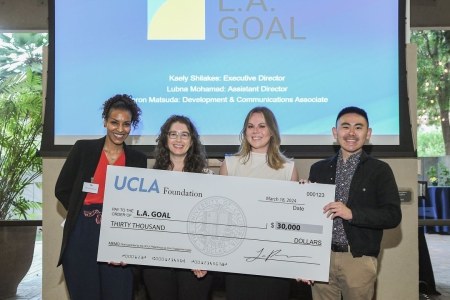‘You will improve someone’s life and probably transform your own’
Honoring more than a decade of UCLA’s Philanthropy as Civic Engagement course
By Lucy Berbeo | July 15, 2024
After more than 10 years and a total of $1 million awarded to Los Angeles nonprofits, UCLA’s Philanthropy as Civic Engagement course has not only changed lives through the work of charities that receive real money awarded by undergraduate students — it’s also frequently named by the students themselves as the most transformative class they’ve taken at UCLA.
“This class has been an absolute journey,” said Emma McNellis, a philosophy major who graduated this June, completing the class during her final quarter. “I’ll remember it forever.”
“You will not change the world in three months, but you will improve someone’s life and probably transform your own,” said course alumna Karina Mathew, who majored in English. “What more could you ask of a one-quarter class or of an education?”
Offered annually as part of UCLA’s Honors Collegium — a series of interdisciplinary honors courses — Philanthropy as Civic Engagement was co-created in 2012 by Assistant Dean of Undergraduate Education Jennifer Lindholm and Vice Provost Emerita and Dean Judith Smith. Each cohort of students, acting as a foundation board, allocates $100,000 to Los Angeles nonprofits using funds provided by donors to UCLA for this purpose. Their efforts have benefited causes from human services to environmental protection to arts and culture and beyond, helping to make a direct impact on the local community. One of this year’s awardees, for example, is L.A. Goal, a nonprofit that provides educational, vocational and recreational programs for adults with developmental disabilities.
Lindholm, who directs UCLA Honors Programs, has led the course for most of the past decade, emphasizing a holistic understanding of philanthropy that extends beyond monetary contributions and encompasses any career path students may choose to pursue.
“Part of this journey has been helping students understand the importance of investing their time, resources and talent in any way that can contribute to the greater good,” Lindholm said. “In class, we focus on elements that are paramount for philanthropy education more broadly at UCLA, in terms of the values of deep kindness, humility, generosity — those overarching constructs that make us think in terms of how and why we give and the future we want to create.”
At a ceremony held on campus this spring, members of the Bruin community recognized the extraordinary $1 million course milestone and celebrated Lindholm’s appointment as Centennial Director for Philanthropy Education at UCLA. The endowed directorship was created through a leadership gift from Madaline and Mark Asofsky to expand philanthropy teaching and learning on campus.
“UCLA is one of the premier public institutions in the world, and it has a unique opportunity to be a driving force in what universities can do in educating and inspiring students, faculty and administration to impact the communities their schools are located in,” Mark Asofsky said. “With Jennifer’s coordinated philanthropy perspective, UCLA should be able to greatly broaden its impact in Los Angeles and surrounding communities.”
The Asofskys’ donation will allow Lindholm to build upon the course’s impact in various ways. The expansion may include working with fellow instructors to add philanthropy elements to other UCLA courses, as well as offering students the opportunity to engage directly with nonprofits, donors and community members. Lindholm’s greater goals include designing a conceptual framework for UCLA’s interdisciplinary philanthropy education program, building collaborative partnerships across campus and weaving philanthropy learning into and beyond the curriculum.
It’s a vision roundly welcomed by those who have witnessed the many positive impacts of Philanthropy as Civic Engagement.
“This course directly benefits the Los Angeles community and also offers undergraduates the kind of unique experiential learning that we want all UCLA students to have,” said Adriana Galván, dean of undergraduate education. “Bruins have the power to change the world, and this is a remarkable opportunity for our students to take their first steps on that journey.”



 David Esquivel/UCLA
David Esquivel/UCLA